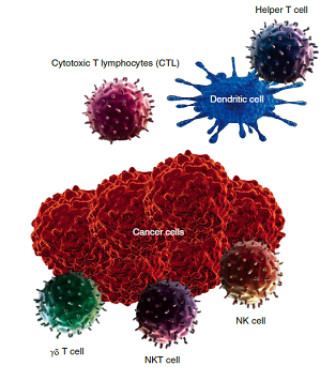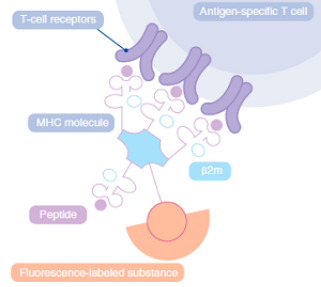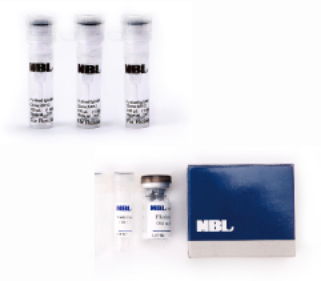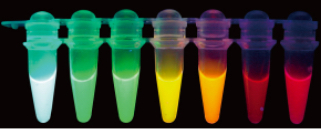Research Reagent
Immuno-Oncology and MHC Tetramer business

Conventionally, cancers have been treated by surgical interventions, radiation therapies and chemotherapies; however, in recent years, more attentions have been devoted to cancer immunotherapies.
“Cancer immunotherapy” is a treatment method to fight cancer utilizing a person’s innate immunological function. Immunocompetent cells, T cells in particular, which patrol our body, possess the ability to kill cancer cells.
However, cancer cells evade the attack of the immune system by expressing a group of molecules on the cell surface of cancer cells that weakens the aggressiveness of T cells. This group of molecules, also known as immune checkpoint molecules, are represented by molecules such as PD-L1 and CTLA-4. In recent years, inhibitory antibodies against these immune checkpoint molecules have been developed, demonstrating dramatic therapeutic efficacy in a certain percentage of patients who have become resistant to chemotherapy drugs. Pioneers in this field, Dr. Tasuku Honjo (Distinguished Professor at Kyoto University) and Dr. James P. Allison (Professor at University of Texas) were jointly awarded the 2018 Nobel Prize in Physiology or Medicine.
The rate of efficacy of immune checkpoint inhibitors on patients is said to be in the range of 5-30% depending on the type of cancer. The responsiveness is correlated with the diversity and antigenicity (ease of being recognized by the immune system) of cancer antigens produced by cancer cells. In cancer immunotherapy, it is important to research the diversity and aggressiveness of immunocompetent cells that specifically recognize these cancer antigens. These days, cellular immunotherapy that uses modified versions of a patient’s own immunocompetent cells, primarily T cells, is actively being developed.

“MHC Tetramer Reagents” developed and marketed by MBL are reagents for detecting T cells, which play a key role primarily in cancer immunotherapies. These reagents detect the quantity of actual immune cells that specifically respond to cancer cells to evaluate the efficacy of cancer immunotherapies.
MBL has been supporting research and development efforts for finding new cancer immunotherapy methods by globally providing MHC tetramer reagents for over 10 years. MBL aims to be a leading global manufacturer of reagents in this area and, at the same time, strive for the development of new products to support cancer immunotherapies, such as immune monitoring reagents and companion diagnostics, to contribute to the further advancement in personalized medicine and precision medicine.
See the web page introducing MHC Tetramer Reagents for details.
Antibodies and kits for research

MBL is researching and developing antibodies and assay kits by utilizing its core technologies of antibody production and supporting the academia and pharmaceutical industry in their research activities. Our company’s high-quality antibody and kit products have long been highly esteemed among researchers in molecular (cellular) biology and are broadly supporting their basic laboratory to clinical research activities.
MBL supports the academia and industry with various technologies and know-how on antibody production, modification, and labeling.
See the web page introducing Antibodies and kits for details.
Fluorescent Proteins and related products

MBL has extensive lineups of products and technologies using unique fluorescent proteins. These are essential technologies and tools for the discovery of molecular target drugs at an early phase of new drug discovery and hence are widely used in research and development by pharmaceutical companies and research institutes worldwide.
See the web page introducing Fluorescent proteins Reagents for details.
